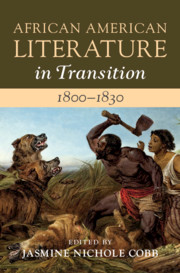Book contents
- African American Literature in Transition, 1800–1830
- African American Literature in Transition
- African American Literature in Transition, 1800–1830
- Copyright page
- Contents
- Figures
- Contributors
- Preface
- Chronology
- Introduction
- Part I Black Organizational Life before 1830
- Part II Movement and Mobility in African American Literature
- Chapter 4 Early African American Literature and the British Empire, 1808–1835
- Chapter 5 Robert Roberts’s The House Servant’s Directory and the Performance of Stability in African American Print, 1800–1830
- Chapter 6 Dream Visions in Early Black Autobiography; Or, Why Frederick Douglass Doesn’t Dream
- Part III Print Culture in Circulation
- Part IV Illustration and the Narrative Form
- Index
Chapter 4 - Early African American Literature and the British Empire, 1808–1835
from Part II - Movement and Mobility in African American Literature
Published online by Cambridge University Press: 11 March 2021
- African American Literature in Transition, 1800–1830
- African American Literature in Transition
- African American Literature in Transition, 1800–1830
- Copyright page
- Contents
- Figures
- Contributors
- Preface
- Chronology
- Introduction
- Part I Black Organizational Life before 1830
- Part II Movement and Mobility in African American Literature
- Chapter 4 Early African American Literature and the British Empire, 1808–1835
- Chapter 5 Robert Roberts’s The House Servant’s Directory and the Performance of Stability in African American Print, 1800–1830
- Chapter 6 Dream Visions in Early Black Autobiography; Or, Why Frederick Douglass Doesn’t Dream
- Part III Print Culture in Circulation
- Part IV Illustration and the Narrative Form
- Index
Summary
This chapter argues the writings published by Blacks in the early national US must be understood in relation to the history of slavery in the British Empire. The author examines diverse forms of African American literature, which were focused on transatlantic concerns, such as “Orations on the Abolition of the Slave Trade” (1808–1823), given annually on January 1. These texts tell powerful stories of the history of the slave trade, and particularly its violence to familial ties, from the trade’s inception in the fifteenth century until its abolition in 1808. Written by free Black churchmen and intellectuals in New York and Philadelphia, including Absalom Jones, Peter Williams, Jr., Russell Parrot, and William Hamilton, these orations demonstrate a deep interest in the actions of the British Parliament and the state of slavery in the West Indies. This chapter also considers direct allusions to British and Afro-British abolitionists and their writings, from Clarkson and Wilberforce to Equiano, in the work of William Miller, Russell Parrot, William Whipper, David Walker, Maria Stewart, and others. The chapter concludes with a discussion of The History of Mary Prince (1831), the most important slave narrative to emerge from the British colonies and questions the inclusion of Prince’s narrative in a history of African American literature.
Keywords
- Type
- Chapter
- Information
- African American Literature in Transition, 1800–1830 , pp. 95 - 118Publisher: Cambridge University PressPrint publication year: 2021

